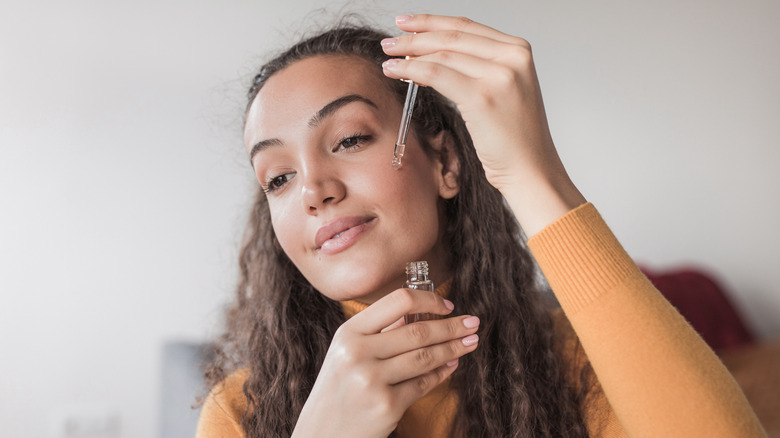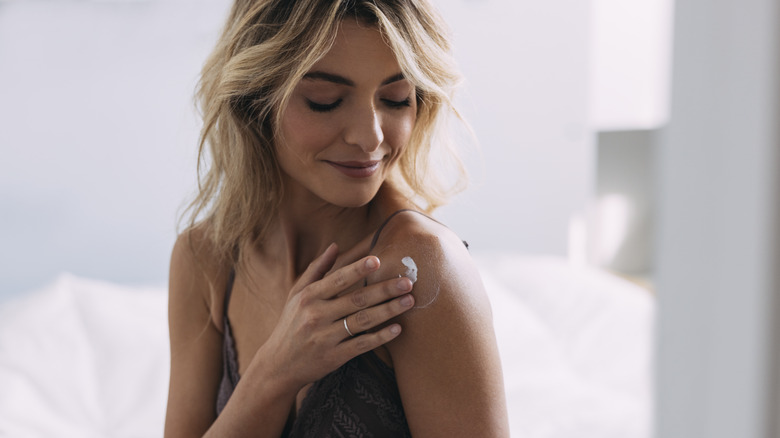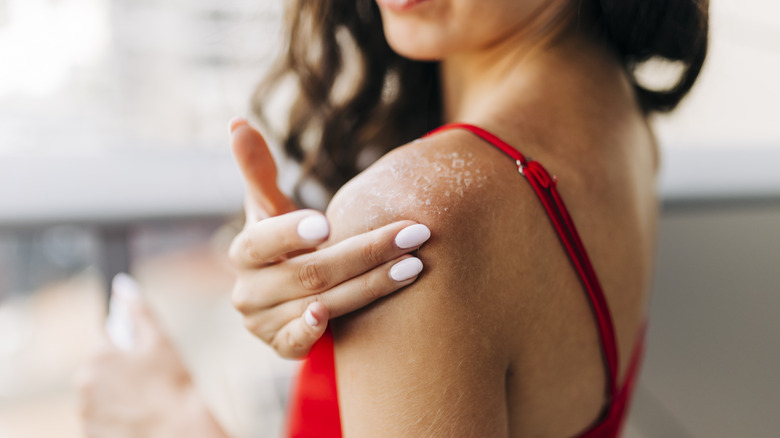The Skincare Benefits Of Squalane Oil, Explained
Squalane is the ingredient you've probably seen written in the back of more than a few beauty products over the years but never actually took the time to researched what it does (at least it is if you're anything like us, anyway). But now's the time to find out what in the world it actually is and what it does. As explained by dermatologist Dr. Alok Vij while speaking to HealthEssentials, "Squalane comes from a lipid that occurs naturally in your skin. It's one of the more common chemical compounds that make up your sebum or the oil that's secreted from your sebaceous glands." So, in other words, squalane is essentially a natural moisturizer. It's actually the hydrogenated version of squalene (with an ”e') which is produced by the sebaceous glands, but can only be added to skincare once hydrogen has been added.
Due to past ethical issues regarding it's original form squalene being collected from animals, squalene is typically sourced from sugarcane or olive oil. as they're more sustainable. But no matter which plant squalene is derived from, once its been converted to squalane, it has a number of big benefits for the skin.
Squalane oil is a seriously good moisturizer
As we already know, squalene is a natural emollient, so it's no surprise then that one of it's main benefits is hydration. If you need a reminder, emollients sit on top and soften the skin. Squalane, however, is special because it specifically imitates the natural sebum produced by the skin. Because of this, it's an ideal moisturizer for a range of skin types and pretty much anyone can use it.
Squalane oil is a particularly great choice for anyone who wants their face to feel moisturized, but not sticky or heavy. "If you don't like the feeling of a thicker face cream, squalene can be really good for you, too, since it's lightweight," Dr. Alok Vij told HealthEssentials of squalane's original form. In fact, Dr. Vij shared that it can be so moisturizing it can even act as a light moisturizer on its own rather than being an ingredient in a moisturizer.
As squalane oil is natural and has the same characteristics of natural oils found on the face, it's less likely to cause irritation in the way some synthetic moisturizers can. It also won't leave a greasy film on the skin or clog pores (though we'll come back to that perk). Squalane is also odorless and light, which are all big pluses when it comes to body or face moisturizers.
And it's great for helping treat some skin conditions
Squalane oil's gentle nature makes it a safe ingredient for people with skin conditions, such as psoriasis and eczema. In fact, research has found squalane contains anti-inflammatory properties that can reduce redness and itching caused by these conditions.
We know how difficult the struggle can be to find skincare products that work for acne-prone skin too, but squalane oil has long been chosen by people with blemishes. That's because of its lightweight nature and, as we know, it's not greasy. Not only that, but, because squalane oil is so gentle on the skin, it shouldn't inflame existing acne and blemishes for most people. The ingredient has also been found to have antibacterial properties, so it has the ability to fend off bacteria that could potentially cause acne. And it's that antioxidant property found in it that can minimize the appearance of wrinkles and fine lines, making the skin look smoother and younger.
However, it's worth noting the jury's still out on how beneficial squalane actually is for people with acne. Dr. Mary L. Stevenson, assistant professor of dermatology at NYU Langone Medical Center, told Self that in some people, the product could actually stimulate sebum production, which may actually lead to breakouts. So, while it may not inflame existing blemish flareups, it could potentially lead to more.
It can also fight skin damage
Another big benefit of squalane is the way it can help combat skin damage. Working with other antioxidants found naturally in the skin, it can actually help recover the skin after UV exposure (though we know it's important to keep that sunscreen on all year round!). According to Dr. Marie Hayag, a board-certified dermatologist and founder of 5th Avenue Aesthetics, who spoke to Byrdie, that's partly down to the fact that squalane can help bring a lot of moisture back to sunburned skin. It can also help fight back against other environmental factors, like airborne toxins and pollutants that can ravage the skin, particularly in big cities.
Squalane's antioxidant properties also have a few other benefits when it comes to aiding skin damage. Amongst them is squalane's ability to improve the look of dark spots on the skin, which creates an overall brighter look to the skin and a clearer complexion.
Squalane oil can even seal in other skincare products
Squalane oil is great to use alongside a range of other skincare products. Remember, there are some skincare ingredients that just don't mix! But you're unlikely to run into that issue here. In fact, Dr. Alok Vij told HealthEssentials that squalane can actually aid the effectiveness of some other products. "You can use it on your face to help seal in cosmetic products like lighter serums or toners that you're using," they shared. And it seems like Dr. Marie Hayag agrees. "This substance is known for locking in hydration by creating a protective barrier on the skin's surface," she shared with Byrdie.
That's why it's recommended you apply squalane last in your beauty routine at night, especially when applying it as a solo product rather than in something else. "If you're going to use a serum or toner, I would use those first and then layer squalene on top. The squalane will sit on the surface of your skin and act as a barrier to prevent moisture from leaving," Dr. Hayag shared. Squalane is safe to use on your skin twice a day (in the morning and night), though, in the morning, it should be applied before sunscreen to avoid diluting your UV protection.




